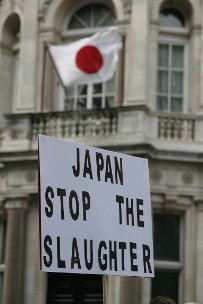
IMMEDIATE PRESS RELEASE
Basingstoke, Hampshire UK
8th August 2006.
Japanese Embassy in London to be focus for worldwide protest against the largest annual slaughter of dolphins in the world
The public are again being invited to once again support an annual international protest against the brutal slaughter of dolphins in Taiji, Japan.
At noon on Wednesday 20 September 2006, marine conservationists and concerned individuals will be gathering outside the Japanese Embassy, in Piccadilly, London, as part of a peaceful world wide protest at what is widely claimed to be a "crime against nature".
Leading marine conservation charity, The Marine Connection, is urging people to bring along a red ribbon to represent the blood of dolphins and small whales killed during these drive hunts; and if possible please also bring items such as a whistle, megaphone or anything to make some noise outside the Japanese Embassy to raise public awareness and show disgust at this continued practice.
Every year in Japan the annual drive hunt (fishery) season - which runs from 1st October to 30th March, sees the slaughter of countless dolphins and small whales. During this time, Japanese fishermen are responsible for the killing of the largest number of dolphins anywhere in the world.
The most notorious of these "hunts" occurs in the village of Taiji, Wakayama Prefecture. Local fishermen sweep the area in fast boats and drive pods of dolphins into shallow coves. The coves are then blocked by the fishing boats, where most of the dolphins are netted and hacked to death and their bodies hauled to a makeshift slaughter area for butchering. Some animals, injured during the capture/killing process who manage to escape are left to die slowly in agony.
A number of the trapped animals are kept alive and selected by marine parks who pay extortionate rates for animals to re-stock their facilities; this is the mainstay of the drive fishery. Many of these animals die of shock before they can be killed or lifted from the blood-red waters.
If the captivity industry did not subsidise these hunts though their purchase of animals, they would not be as lucrative for the fishermen as there is not enough profit in the sale of dolphin/whale meat for consumption alone to sustain them - in short the captivity industry are the reason these hunts continue to operate in profit.
For the past three years the Marine Connection have supported this campaign, working in association with their colleagues Ric and Helene O'Barry of One Voice to highlight the suffering these hunts cause to the animals. Ric & Helene have, and continue, to go to great efforts risking their safety, to document the annual slaughter and bring this to the attention of the public.
Further details, and a downloadable petition, can be found on The Marine Connection website http://www.marineconnection.org
ENDS
Media enquiries to: John Hicks, Headline Promotions, Press & PR
Mobile: 07771 575 654Fax: 0707 520 9717
http://www.headlinepromotions.blogspot.com/
Further information and images available from
Liz Sandeman
Director of Operations
The Marine Connection
PO Box 2404, London, W2 3WG
Tel: 020 7499 9196 fax: 020 7409 2133
liz@marineconnection.orgwww.marineconnection.org
Notes for Editors
The Marine Connection (registered UK charity 1062222) is a London-based charity, established in 1997. Over the last few years, the charity has progressed from a small voluntary organisation to one of the UK’s established international conservation charities. One of the charity’s main aims is to ensure as many people as possible realise and understand the importance of protecting dolphins, whales and porpoises and their natural habitat. One way they achieve this is through a mix of campaigning, education and research.Through the charity’s informative website and quarterly magazine, Seventh Wave, the charity encourages supporters worldwide to participate in helping to protect dolphins and whales and support various projects.In the UK, the Marine Connection carries out vital educational project work in the Moray Firth area of Scotland, which is home to the most northerly population of bottlenose dolphins in the world. Through the charity’s Adopt A Dolphin project, people learn more about how to help conserve these marine mammals and their fragile eco-system.
This article was first published and sydicated by The American Chronicle series of newspapers
Keywords: Taiji, dolphins, Marine Connection, Headline Promotions, Liz Sandeman, Japanese Embassy, dolphin slaughter protest, One Voice


